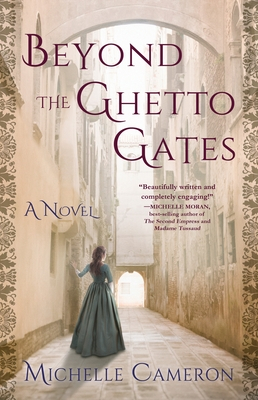Beyond the Ghetto Gates
- 2020 INDIES Finalist
- Finalist, Religious (Adult Fiction)
Though it is set in turbulent times, Beyond the Ghetto Gates is a timeless coming-of-age story.
A teenager’s world is upturned as she’s pulled between her timeless desire and her sense of family duty in Michelle Cameron’s historical novel Beyond the Ghetto Gates.
The novel is set during Napoleon’s eighteenth century Italian campaign. Mirelle, the daughter of a famous ketubah artist in a workshop of high standards, is skilled at accounting; this puts her at odds with her rabbi, who believes such work is unbecoming for a woman. She’s unsettled by her circumstances and bristles over her mother’s desire that she wed. But when antisemitic violence strikes home, she resolves to help her family’s business, no matter the risks.
Meanwhile, Napoleon liberates Mirelle’s gated ghetto; the outward changes are swift. Christophe, a Catholic soldier who’s garrisoned nearby and who’s a friend of Mirelle’s cousin Daniel, is enchanted by Mirelle, though she questions his sincerity.
A parallel story focuses on Francesca, whose story line sets off an already volatile atmosphere. She is a Catholic who takes note of a miraculous portrait of the Virgin Mary; the portrait, which winds up being stolen, ties the characters together in a potent way. Francesca’s husband, Emilio, is a rabble rouser whose inflammatory brutality affects Mirelle, a friend, and their families.
Napoleon is a surprising addition to the cast; his character is nuanced and interesting. He’s a commanding tactician whose insightful speeches and gestures suggest both a hot temper and tolerant restraint. Speculative whimsy enters the story through his reaction to the portrait of Mary.
Daniel also stands out as a forthright, compassionate soldier who sees past other people’s weakness, and whose military role helps him touch all of the others’ lives. He and Francesca move from being wary of each other to having respect for each other’s differences, despite the anguish that Emilio causes.
Mirelle’s love for her family’s trade makes her sympathetic, while her other longings are contemporary without being interruptive. Though her independent streak animates her decisions, she’s respected in her community. Characters’ faiths are positioned against the French Enlightenment, and the costs of intolerance are made apparent.
The book’s intrigue mounts after a sudden proposal, which is contrived to create pressure on Mirelle: the man who proposes to her is the ketubah workshop’s benefactor and a family friend, though he also proves to be a gentleman who gives Mirelle the space to make her own decisions.
Meanwhile, Mirelle’s feelings for Christophe intensify after only a handful of encounters. Much is made of their religious differences. However, Christophe is not fleshed out enough for their passion to resound. A friend’s interference, and Mirelle’s lapse of judgment, lead to a false alarm that threatens Mirelle’s reputation, but these entanglements are resolved. The book’s unexpected outcome is a hasty one in which satisfied desires come at the cost of hurting others.
Beyond the Ghetto Gates is set in turbulent times, but its story is a delicate one about coming of age when all that’s familiar is changing.
Reviewed by
Karen Rigby
Disclosure: This article is not an endorsement, but a review. The publisher of this book provided free copies of the book and paid a small fee to have their book reviewed by a professional reviewer. Foreword Reviews and Clarion Reviews make no guarantee that the publisher will receive a positive review. Foreword Magazine, Inc. is disclosing this in accordance with the Federal Trade Commission’s 16 CFR, Part 255.

